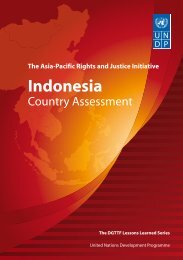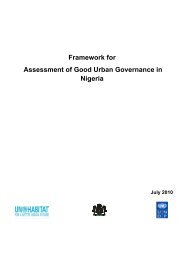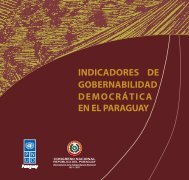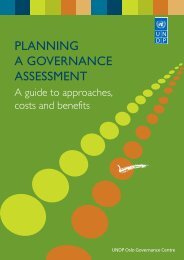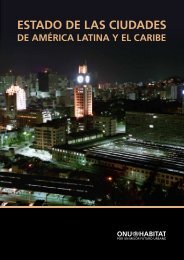A Users' Guide to Measuring Local Governance
A Users' Guide to Measuring Local Governance
A Users' Guide to Measuring Local Governance
You also want an ePaper? Increase the reach of your titles
YUMPU automatically turns print PDFs into web optimized ePapers that Google loves.
groups of ac<strong>to</strong>rs that feature on flashcards: the (i)<br />
Union Parishad, (ii) community organizations/<br />
citizens, (iii) traditional leaders/institutions (e.g. the<br />
elite, religious leaders), (iv) government line agencies,<br />
(v) private sec<strong>to</strong>r, (vi) support organizations<br />
(NGOs).<br />
Participants are invited <strong>to</strong> discuss these two questions:<br />
1 Demand for good local governance: How well<br />
is the citizens’ participation in regard <strong>to</strong><br />
governance?<br />
2 Supply of good local governance: How well<br />
does the local government function?<br />
The evaluation of local governance issues, at both<br />
the community and UP levels, takes place in<br />
several small groups of maximum 8 persons (see<br />
Key ac<strong>to</strong>rs/stakeholders session as well). Such an<br />
assessment is undertaken through a questionnaire<br />
examining some “core governance issues” (20 for<br />
the community LGSA and 28 for the UP LGSA,<br />
organised in<strong>to</strong> the demand and supply sides of<br />
local governance). Once participants in each group<br />
all agree on what the question means and what<br />
the ideal situation would look like, they make their<br />
individual ranking regarding the current situation.<br />
The ranking is done on a common poster paper<br />
on a score from 1 <strong>to</strong> 6. Table 27 provides<br />
some examples of “core governance issues”<br />
covered in the community questionnaire, and the<br />
scoring system.<br />
Once all issues are assessed, each group should<br />
decide on a maximum of four issues that they<br />
would like <strong>to</strong> see improved; these issues will be<br />
further discussed with the other groups in order <strong>to</strong><br />
draw up a final list of priority issues that have <strong>to</strong> be<br />
improved. At the community level LGSA, these<br />
priorities can be expected <strong>to</strong> be improved either<br />
by community groups or by the Union Parishad;<br />
while, at the UP level LGSA, the priority issues<br />
identified in the meeting will only be the<br />
responsibility of the Union Parishad that is meant<br />
<strong>to</strong> develop a <strong>Local</strong> <strong>Governance</strong> Improvement Plan<br />
accordingly. Results from the community<br />
self-assessment are expected <strong>to</strong> be presented <strong>to</strong><br />
the Union Parishad in order <strong>to</strong> be integrated in the<br />
<strong>Local</strong> <strong>Governance</strong> Improvement Plan.<br />
Key ac<strong>to</strong>rs/stakeholders<br />
COMMUNITY LEVEL LGSA: Participants at the<br />
meeting should include: community Based<br />
Organisations representatives, local business<br />
people, youth, traditional leaders, ordinary citizens<br />
(farmers, housewives, etc.), Union Parishad<br />
member of the ward (as guest, not participant) and<br />
Union Parishad women member of the greater<br />
ward (as guest, not participant). It is recommended<br />
<strong>to</strong> leave the invitation process <strong>to</strong> a CBO interested<br />
in organising the citizens’ LGSA and not <strong>to</strong> any<br />
member of the Union council. Facilita<strong>to</strong>rs for the<br />
meetings are represented by community members<br />
oriented and trained in advance.<br />
Community meetings can be held at different<br />
levels, at village, ward or greater ward level. The<br />
meetings aim <strong>to</strong> give the opportunity <strong>to</strong> be<br />
involved in assessing local governance functioning<br />
<strong>to</strong> different ac<strong>to</strong>rs and a wider public, particularly<br />
those belonging <strong>to</strong> the most vulnerable groups.<br />
UNION PARISHAD LGSA: Participants should<br />
represent different ac<strong>to</strong>rs at the Union Parishad<br />
level: the Union Parishad chairman, Union Parishad<br />
members and secretary, as well as some<br />
representatives from community organizations,<br />
the private sec<strong>to</strong>r and traditional leaders. One or<br />
more Partner NGOs facilitate the meeting.<br />
Gender focus<br />
The LGSA strongly encourage the participation<br />
of women in the decision-making process. In<br />
particular, during the assessment’s phase concerning<br />
the evaluation of governance issues, a particular<br />
group for women is expected <strong>to</strong> be constituted for<br />
both the community and UP LGSA in order <strong>to</strong> allow<br />
them <strong>to</strong> express their opinions freely. Furthermore,<br />
in the (community LGSA questionnaire, a<br />
key question concerns the extent of women<br />
participation in the UP meetings; while, in the UP<br />
level assessment, specific questions are formulated<br />
about the voice of women members in UP<br />
meetings as well as the participation of women in<br />
the decision-making of the village court and in the<br />
coordination meetings.<br />
Poverty focus<br />
The participation of the poor and other<br />
marginalised groups in the decision-making<br />
118 UNDP Oslo <strong>Governance</strong> Centre




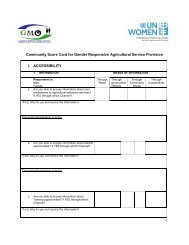

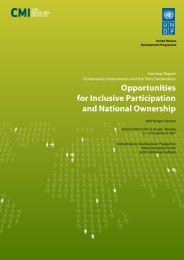
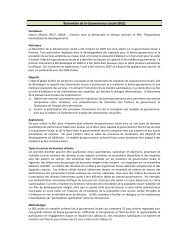
![GuÃa del Usuario ] - Governance Assessment Portal](https://img.yumpu.com/44740603/1/190x253/gua-a-del-usuario-governance-assessment-portal.jpg?quality=85)
